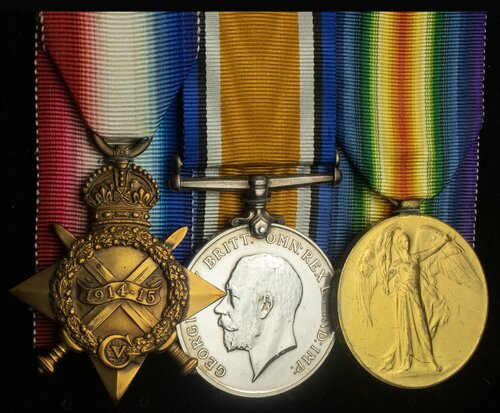
Auction: 22102 - Orders, Decorations and Medals e-Auction VI - e-Auction
Lot: 324
Three: Private P. Welsh, Gordon Highlanders, who was killed in action on 2 March 1916
1914-15 Star (3-7298 Pte. P. Welsh. Gord: Highrs.); British War and Victory Medals (3-7298 Pte. P. Welsh. Gordons.), good very fine (3)
Peter Welsh served in France with the 1st Battalion, Gordon Highlanders and was killed in action on 2 March 1916. He is commemorated upon the Ypres (Menin Gate) Memorial. Making their way to the start line at 0415hrs with 76th Brigade, the men of the Gordon Highlanders shared in re-capturing 'The Bean' but were badly cut down by machine-gun fire from the left side. The operation cost the Brigade some 1,622 casualties in all.
R. G. A. Hamilton was commanding an Artillery Battery on that day and recalled what he saw:
'I got up at 4am and went over to the Battery. It was pitch dark and I nearly broke my neck crossing the little trestle bridge over the moat. At half-past, to a second, then bombardment began with an appalling crash, hundreds and probably thousands of guns from 18 pounders up to “Grandmama”, the great 15 inch howitzer, let fly it together. For the next hour the noise was simply indescribable. It was almost impossible to distinguish the report of one gun from that of another; the only thing it can be compared to is the roll of a drum. We have the ramparts of the town near us, and the noise was intensified by the continuous echo. It was quite impossible to make oneself heard, even by yelling in a person’s ear. After an hour, it began to die down and by the time I came over to breakfast at 8 o’clock it was fairly quiet. The Hun, to my surprise, took it lying down – at least, as far as our area was concerned, he did not fire at all. As soon as the bombardment began, we saw the German SOS signals going up all along the zone that was threatened. There were red rockets bursting into red stars. Soon after, rockets of all colours went up – white, green, red, golden rain, and even red golden rain. I imagine these were meant to confuse us.
About 9 o’clock the wounded began to stream down the road. All those who could walk took himself to the field hospitals. Only the bad cases can be taken in the motor ambulances; these went by in streams also. Most of the men were very cheerful at the prospect of a slight wound that would take them home for a bit. They were principally men who would been hit through the arm or leg by rifle bullets. They told us they had got back our lost trenches and also has some of the old German trenches. They said they had been wonderfully supported by the artillery, whose fire had kept just in front of them as they charged. In spite of the bombardment, the German trenches were full of men, and they had to charge under very heavy rifle and machine-gun fire. The Suffolks and the Gordon Highlanders seem to have lost most. Some men of the former regiment said their battalion was wiped out; but men always say they are the sole survivors. A little later, convoys of German prisoners came through and escorts with fixed bayonets – I should think between 200 and 300 in all, no officers. They were quite a good lot of men, in the prime of life. All wore the flat round cap – no helmets. They have been trying to get into Ypres for 18 months, and now they have succeeded!'
Subject to 20% VAT on Buyer’s Premium. For more information please view Terms and Conditions for Buyers.
Sold for
£120
Starting price
£50




